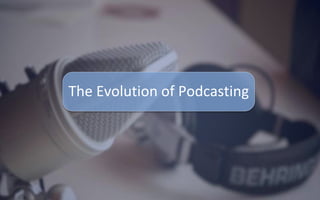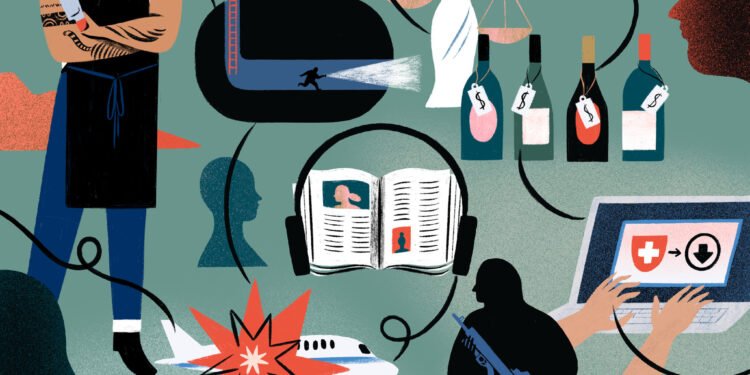Table of Contents
ToggleIntroduction
How Podcasts Are Becoming The New Audiobooks Over the past ten years, the audiobook sector has experienced exponential expansion. Millions of readers who are looking for flexibility, convenience, and a novel method to absorb literature now prefer audiobooks thanks to the growth of platforms like Audible, Google Play Books, and Apple Books.
Listeners can enjoy their favorite stories on audiobooks while they work out, commute, or do housework. Podcasts, on the other hand, have become a new competitor in the audio entertainment market.
Podcasts are rapidly overtaking audiobooks as a medium that appeals to people who wish to consume long-form content, despite its traditional use as a storytelling, entertainment, and informational tool. The emergence of podcasting has changed our perspective on narrative, and in many respects, podcasts are now taking the place of audiobooks.
Indeed, a lot of podcasts today provide highly narrative-driven content that is akin to audiobooks in terms of sound design, serialized storytelling, and well-written scripts, all of which draw in audiobook listeners. Podcasting is reinventing what it means to “listen” to a book as technology develops further, providing a dynamic and captivating substitute for conventional audiobooks.
The Evolution of Audiobooks and Podcasts
1. A Brief History of Audiobooks
The history of audiobooks dates back to the 1930s when recorded books were first produced for blind readers. However, it wasn’t until the 1980s, with the rise of cassette tapes and the advent of personal cassette players, that audiobooks began to gain widespread popularity. With the growth of CDs and, later, digital downloads, audiobooks became more accessible and desirable to a broader audience.
The 2000s saw the explosion of digital audiobooks, especially with the rise of online retailers like Audible (launched in 1995) and platforms like iTunes, making it easier than ever for readers to access audiobooks from a vast catalog. By 2015, audiobooks were fully integrated into the digital entertainment landscape, becoming an established genre of literature in its own right. Audiobooks have become a staple of modern literary consumption, reaching listeners who might not otherwise read a physical book.
However, podcasts were rapidly carving out their own space in the world of digital audio. Podcasts, as a medium for storytelling and education, began to gain traction in the mid-2000s, with the advent of platforms like iTunes and later Spotify, where shows could be downloaded and streamed directly to users’ devices. While podcasts initially focused on talk shows, interviews, and discussions, their growth exploded with the advent of serialized fiction, narrative-driven content, and immersive audio formats.

2. The Rise of Podcasts as a Storytelling Medium
The explosion of podcasts in the last decade has fundamentally changed the way people consume content. Podcasts now span every conceivable genre, from true crime to self-help to fiction, and everything in between. In particular, narrative-driven and serialized podcasts, such as Welcome to Night Vale, The Truth, and LeVar Burton Reads, have made the format an attractive option for listeners who want to hear stories and fiction unfold in real-time.
Unlike traditional radio programs, podcasts allow listeners to choose the content they want to hear and consume it on their own time, giving them unparalleled control over their listening experience. As podcasts evolved, it became clear that podcasting and audiobooks shared many similar qualities, such as voice acting, immersive soundscapes, and an emphasis on storytelling. However, podcasts also offer a level of flexibility, interactivity, and social engagement that audiobooks traditionally do not.
One of the key factors driving the growth of podcasts as a form of storytelling is the rise of platforms such as Spotify, Apple Podcasts, and Stitcher, which have democratized access to both content creators and consumers. By providing low barriers to entry, these platforms allow a wide range of creators to experiment with long-form narratives, much like authors working within the audiobook space. As the quality of podcast production increased, it became clear that podcasts could hold a candle to the traditional audiobook.
Read more
The Similarities Between Podcasts and Audiobooks
1. Long-Form Content
One of the most striking similarities between podcasts and audiobooks is the ability to consume long-form content. Audiobooks, by their nature, are lengthy, often running several hours or even days in length for a single book. Podcasts, in the case of serialized or story-driven shows, can also offer similarly lengthy content. Many podcasts feature episodes that run for anywhere from 30 minutes to an hour, and when aggregated into series, they can add up to the same length as an audiobook.
Serialized podcasts, in particular, are now offering multi-episode arcs, much like a traditional audiobook. This allows listeners to experience an ongoing story over several weeks or months, in a format that mirrors the experience of listening to an audiobook with multiple chapters.
2. Narrative Storytelling
Both audiobooks and podcasts are heavily focused on storytelling. In the case of audiobooks, the story is typically adapted from a published book, where the narration is read aloud by a professional voice actor or the author themselves. With podcasts, however, there is no pre-existing novel to work with—although some podcasts are based on books—so the narrative is typically written and produced specifically for the podcast medium. This difference has allowed for a great deal of creativity in podcasting, where producers can experiment with new genres, immersive experiences, and alternative forms of storytelling.
3. Immersive Sound Design
One of the most important aspects of both audiobooks and podcasts is their sound design. Just as audiobooks use sound to enhance the listening experience (such as the sound of ambient noise, music, or even sound effects), many podcasts—particularly narrative-driven ones—also integrate elaborate sound design to heighten the immersion of their stories. For example, fictional podcasts like Alice Isn’t Dead or The Black Tapes rely heavily on sound effects to build atmosphere and create a sense of tension. This makes listening to a podcast a deeply immersive experience similar to the world-building found in many audiobooks.
4. Accessibility and Convenience
Both podcasts and audiobooks offer an unparalleled level of convenience for listeners. With a podcast, listeners can stream or download episodes at their leisure, and similarly, audiobooks can be downloaded directly to a phone or tablet and listened to while on the go. Both formats enable listeners to consume content while multitasking—whether they are commuting, exercising, or cleaning the house.
Additionally, podcasts and audiobooks are accessible to anyone with an internet connection or a device capable of streaming. This democratization of access has made both formats extremely popular, especially among people who may not have the time or inclination to read a traditional print book.
Why Podcasts Are Becoming the New Audiobooks
1. Flexibility of Content Delivery
One of the main reasons podcasts are rapidly becoming a competitor to audiobooks is their flexibility in content delivery. Podcasts allow for shorter, episodic content, which appeals to listeners who may not have the time or inclination to consume an entire audiobook in one sitting. While audiobooks often require a long-term commitment, serialized podcasts are segmented into smaller, bite-sized episodes, which makes them easier to digest and incorporate into daily routines.
Listeners can choose how much content they wish to consume at one time, meaning that even casual listeners can become hooked on podcasts. In contrast, audiobooks require a more significant time investment to finish a single book, which can be off-putting to some listeners. This flexibility allows podcasts to cater to a wider variety of listening preferences.
2. The Rise of Serialized Storytelling
Serialized storytelling has exploded in the podcast world, with a wide range of podcasts offering long-form narratives that unfold over multiple episodes. These serials often mirror the pacing and structure of a traditional audiobook, but in a more episodic format. This offers listeners a way to engage with stories over a longer period, rather than the traditional “one-and-done” nature of audiobooks.
The ability to “binge-listen” to podcasts in a way that is similar to binge-watching TV series has further fueled the popularity of serialized podcasts. This narrative style creates anticipation, much like when listeners anticipate the next chapter in an audiobook. As podcast episodes accumulate, the story builds momentum, offering the same rewarding experience that audiobooks provide, but with added flexibility.
Read more
3. Increased Accessibility and Affordability
Unlike audiobooks, which are often sold on an individual basis or through a subscription service like Audible, podcasts are generally free to listen to. This makes them an attractive option for listeners who may be hesitant to pay for audiobooks or who prefer a more cost-effective solution for accessing long-form content. With so many podcasts available at no cost, listeners are more likely to dive into a new show without worrying about purchasing each episode.
While audiobooks often require a financial commitment, whether through purchasing individual titles or subscribing to a platform, podcasts lower the barrier to entry, making it easier for anyone to enjoy long-form audio content without financial constraints.
4. Creative Freedom and Innovation
Podcasting offers a level of creative freedom that is sometimes limited in traditional audiobooks. Many podcasters experiment with genre, format, and even the delivery of their stories. For example, fictional podcasts like The Magnus Archives blend horror, mystery, and drama with sound design, voice acting, and intricate plots to create a completely immersive experience. This level of creative experimentation has opened up new avenues for storytelling, which audiobooks, with their more traditional format, may not always be able to replicate.
Furthermore, podcasts often allow for more unconventional narratives, including interviews, historical storytelling, and nonfiction narratives that can feel much more dynamic than the sometimes static nature of traditional audiobooks.

The Future of Podcasts and Audiobooks
As the world of audio entertainment continues to evolve, it is clear that podcasts and audiobooks will coexist, but with increasingly blurred lines between the two formats. In the future, we may see more hybrid formats that merge aspects of both mediums. Audiobook publishers may experiment with episodic releases, mirroring the serialized storytelling model of podcasts, and podcast producers may delve further into more polished, audiobook-like productions.
The rise of AI technology, advances in sound design, and continued growth of streaming platforms will undoubtedly lead to more experimentation with storytelling in both mediums. As listeners demand more diverse, creative, and flexible content, the boundaries between podcasts and audiobooks will continue to evolve, offering even more opportunities for content creators to innovate.
Read more
FAQ
1. What is the difference between a podcast and an audiobook?
While both are audio formats, the main difference lies in their structure. Audiobooks are typically recordings of published books, while podcasts are episodic audio content that may focus on storytelling, interviews, or discussions. Podcasts are often free to listen to, while audiobooks are generally purchased or subscribed to through services like Audible.
2. Can podcasts be considered a replacement for audiobooks?
For some listeners, podcasts are becoming an alternative to audiobooks, especially due to their episodic nature and accessibility. However, audiobooks still remain a primary format for full-length, finished works of literature, while podcasts are more likely to feature serialized storytelling or a mix of genres and formats.
3. Are podcasts better than audiobooks?
This depends on personal preference. Podcasts offer shorter, more flexible episodes and often provide innovative storytelling. However, audiobooks offer complete, uninterrupted narratives, which some listeners prefer. Both formats have their strengths and offer different listening experiences.
4. How can I listen to both podcasts and audiobooks?
Both podcasts and audiobooks can be listened to on a variety of platforms. Podcasts are accessible through platforms like Spotify, Apple Podcasts, and Google Podcasts, while audiobooks can be accessed through services like Audible, Apple Books, or library apps like Libby and OverDrive.
5. What is the future of podcasts and audiobooks?
The future likely involves greater overlap between podcasts and audiobooks. We may see more serialized storytelling in audiobooks and more narrative-driven podcasts that resemble traditional audiobook content. Both formats will continue to evolve and offer listeners more diverse and creative ways to engage with audio entertainment.















